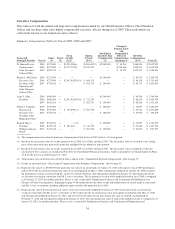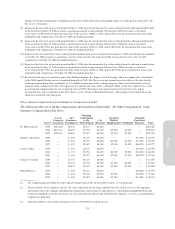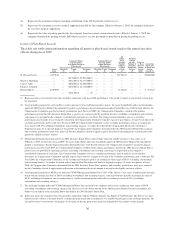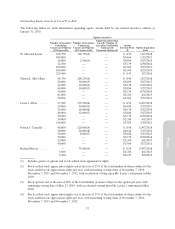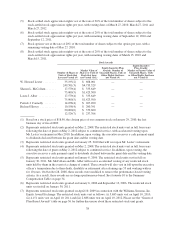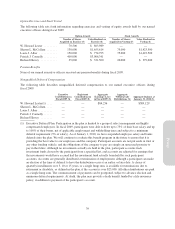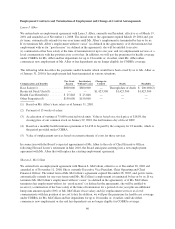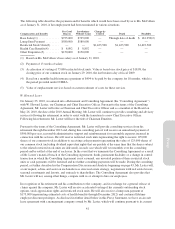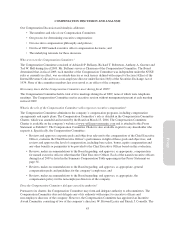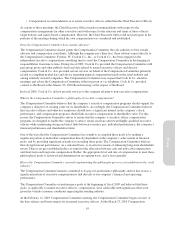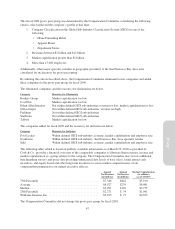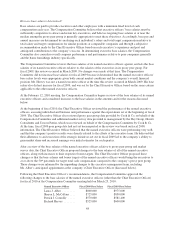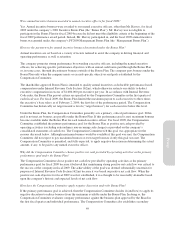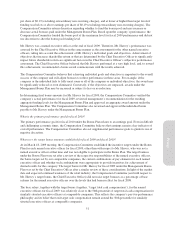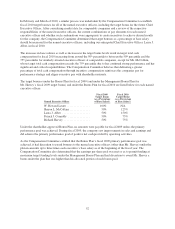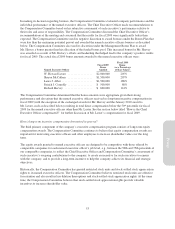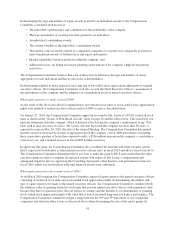Pottery Barn 2009 Annual Report Download - page 138
Download and view the complete annual report
Please find page 138 of the 2009 Pottery Barn annual report below. You can navigate through the pages in the report by either clicking on the pages listed below, or by using the keyword search tool below to find specific information within the annual report.Compensation Committee delegated the Incentive Award Committee the ability to grant equity awards under the
company’s 2001 Long-Term Incentive Plan and cash awards to those employees who are not executive officers.
This delegation is reviewed annually and certain limitations (including the number of shares subject to the grants,
the maximum size of cash awards and which individuals may receive grants) are placed on the Incentive Award
Committee’s authority. Reports of equity and cash grants made by the Incentive Award Committee are included
in the materials presented at the Compensation Committee’s regularly scheduled meetings.
Does the Board sometimes make compensation decisions regarding named executive officers?
Although the Compensation Committee has authority and responsibility to determine and approve compensation
for named executive officers, there is, on rare occasion, a compensation determination that the Compensation
Committee believes is most appropriate to bring to the Board. One such instance arose during fiscal 2009, in
connection with discussions around Mr. Lester’s potential retirement as our Chairman and Chief Executive
Officer. Mr. Lester’s service has been fundamental to the growth and success of the company since he first
assumed the position of Chief Executive Officer in 1979, and the Compensation Committee believed it was
necessary to secure his services as a consultant to provide assistance where he has unique experience and
perspective, as further described below. For this reason, the Compensation Committee believed that it was most
appropriate for the full Board to have the opportunity to review and vote on the terms of Mr. Lester’s retirement
and his transition from his current role to that of a consultant and advisor. As a result, on January 25, 2010, the
independent members of the Board approved the company’s entry into a Retirement and Consulting Agreement
with Mr. Lester, which is discussed further below and is described in the section titled “Employment Contracts
and Termination of Employment and Change-of-Control Arrangements” beginning on page 40.
What is management’s role in the compensation-setting process?
Although the Compensation Committee generally does not delegate any of its authority with respect to executive
officers and non-employee directors of the company, management does play a significant role in the
compensation-setting process for executive officers other than the Chief Executive Officer. In particular,
management assists the Compensation Committee with the following:
• Evaluating individual executive performance against established revenue and profitability targets for the
fiscal year, including business unit achievement of budget targets;
• Recommending appropriate business performance targets and objectives for the upcoming fiscal year; and
• Recommending salary and cash bonus levels and equity awards based on performance evaluations and a
review of peer group data. Management considers the respective responsibilities of the executive officers,
the current combination of pay elements for each executive and whether that combination is appropriate
to provide incentives to achieve the desired results for the company. Management considers the
proportion of base salary to cash bonus levels and believes that a significant portion of each executive’s
total cash compensation should be at risk and payable only if the company achieves certain levels of
performance. In addition, management recognizes the Compensation Committee’s view that equity
awards should reflect each executive’s performance for the year and align the executive’s financial
reward with shareholder return. After considering these factors, management may recommend to the
Compensation Committee changes in the amount and type of each element of total compensation.
Management prepares meeting information for each Compensation Committee meeting and works with the
Committee Chairperson to establish meeting agendas. Materials are provided to the Compensation Committee
members several days in advance of each meeting. The Compensation Committee considers, but is not bound to
and does not always accept, management proposals. The Chief Executive Officer also participates in
Compensation Committee meetings at the invitation of the Compensation Committee to provide:
• Background information regarding the company’s strategic objectives;
• Evaluations of the performance of senior executive officers; and
44


